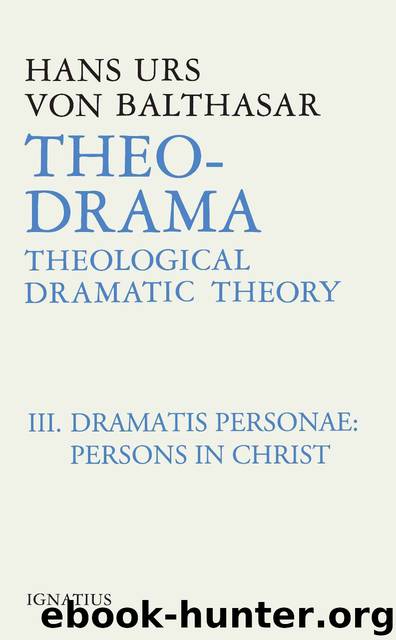Theo-Drama, Vol. 3: Dramatis Personae: Persons in Christ by Hans Urs von Balthasar

Author:Hans Urs von Balthasar [von Balthasar, Hans Urs]
Language: eng
Format: mobi
Tags: Spiritual & Religion
ISBN: 9781681495774
Publisher: Ignatius Press
Published: 1993-02-28T16:00:00+00:00
C. THE CHURCH OF JEWS AND GENTILES
1. The Church as a “People”
Gathered from Many “Peoples ”
Up to now we have considered the Church primarily with regard to her form. While she has come forth from Christ, she is the feminine partner, his “helpmate”. Rendered fruitful through his Spirit (including the fruitfulness that attaches to her objective, official side), she ministers to his work for the world through her fruitfulness—which is his in her. So far, however, we have not brought out the fact that she necessarily transcends (5a) the form in which she is discerned.
This can only become clear if the Church is no longer seen primarily as a quasi-person in the theo-drama but directly, existing in the social dimension as one “people” out of many “peoples”; in concrete terms, the Church is the “People of God” consisting of Jews and Gentiles. Initially the Jewish nation is seen in its particularity; when the Gentile element is added, it means that this particularity is opened up to the unlimited totality of mankind. This accords with the theological assertion that the word of God, hitherto addressed to Israel, has now become “flesh”, that is, man: thus the Word of God adopts the form and the expressive power of man-as-such. True, Israel itself, right from the beginning (ever since the promise to Abraham that all nations of the earth would be blessed in him and his descendants), was self-transcendent, pointed toward mankind as a whole; the tension between particularity and universality is not solely a feature of the Church of Christ but had already applied to Israel, into whose inheritance the Church was seen as entering. The question is: Is there anything new and original, vis-à-vis Israel, in the Church’s claim to catholicity?
This directs the spotlight to that point on the theological world stage that is both the center of the tragedy of God and mankind—Israel’s No to what, in the Christian perspective, would have been its fulfillment—and also the Church’s birthplace (insofar as the Church, in coming forth out of Israel, sets herself apart from the latter). The difference between Israel and the
Christian Church is not that Israel has a (“formal”) openness to “all nations” whereas the Christian Church has an explicit world mission; it lies in the tragedy unfolded in the Gospels and in the Acts of the Apostles, that “his own received him not” (Jn 1:11)—and here “his own” must be taken primarily in an ethnic, not an individual, sense. Thus the Church comes about as a result of a tragedy—central to world history, interpreted theologically—but its last act has not been played, with the result that the essence of the “person” and “role” of the Church is as yet unsettled, uniquely so. If Israel’s No were to prove not to be ultimate, would the shape of the Church change, and in what way?
This question is all the more strange since the ethnic aspect seems to be specific to Israel, something that cannot be given up; how could it remain
Download
This site does not store any files on its server. We only index and link to content provided by other sites. Please contact the content providers to delete copyright contents if any and email us, we'll remove relevant links or contents immediately.
The Lost Art of Listening by Michael P. Nichols(7494)
Why I Am Not A Calvinist by Dr. Peter S. Ruckman(4149)
The Rosicrucians by Christopher McIntosh(3513)
Wicca: a guide for the solitary practitioner by Scott Cunningham(3167)
Signature in the Cell: DNA and the Evidence for Intelligent Design by Stephen C. Meyer(3131)
Real Sex by Lauren F. Winner(3014)
The Holy Spirit by Billy Graham(2944)
To Light a Sacred Flame by Silver RavenWolf(2814)
The End of Faith by Sam Harris(2733)
The Gnostic Gospels by Pagels Elaine(2527)
Waking Up by Sam Harris(2454)
Nine Parts of Desire by Geraldine Brooks(2361)
Jesus by Paul Johnson(2352)
Devil, The by Almond Philip C(2325)
The God delusion by Richard Dawkins(2305)
Heavens on Earth by Michael Shermer(2278)
Kundalini by Gopi Krishna(2180)
Chosen by God by R. C. Sproul(2161)
The Nature of Consciousness by Rupert Spira(2104)
